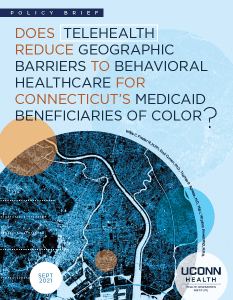The onset of COVID-19 resulted in unprecedented changes in the preferred modality of health services delivery. Safety concerns regarding in-person visits and risk of COVID-19 transmission led policymakers to fully embrace telehealth for clinical care delivery. The Centers for Medicare & Medicaid Services implemented a number of COVID-19 flexibilities and waivers to make telehealth visits more accessible for patients and providers. Many states also implemented additional polices to further improve the availability of telehealth. This report presents initial findings regarding potential racial/ethnic differences in the geographic distribution of and access to Medicaid-eligible behavioral health services and facilities in Connecticut.
DOES TELEHEALTH REDUCE GEOGRAPHIC BARRIERS TO BEHAVIORAL HEALTHCARE FOR CONNECTICUT’S MEDICAID BENEFICIARIES OF COLOR?
Willie C. Frazier III, M.P.H., Emil Coman, Ph.D., Thomas P. Agresta, M.D., M.B.I.; Wizdom Powell PhD, M.P.H.
Funded by the Commonwealth Fund’s Medicaid program to study behavioral health disparities, this grant supports HDI’s efforts to investigate the patterns of behavioral health services use among Black adult male Medicaid beneficiaries in Connecticut, and the geographic distribution of the behavioral health in-person and telehealth services they access. This is the first brief in the series.
